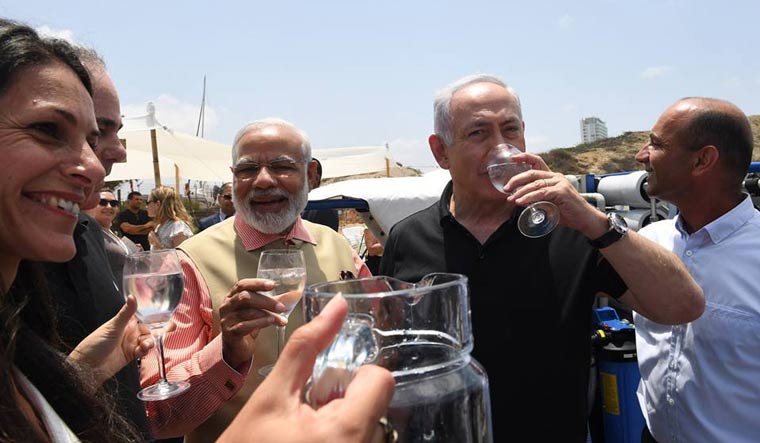The chemistry is still very much alive. Israel Prime Minister Benjamin Netanyahu may have called off his visit to India—at the last minute and for a second time—but India is a “precious friend,'' asserted Israel Ambassador Ron Malka.
Malka was responding to a question at an interaction, organised by the Indian Association of Foreign Affairs Correspondents. He clarified that Netanyahu choosing to go to Russia instead of visiting India was not a reflection of importance but urgency.
The visit of Netanyahu, which was scheduled to take place on September 9, was highly publicised. The Israel ambassador stressed that the prime ministers of both the countries are “close friends. “The relationship with Israel is expanding. Many processes, projects and initiatives are becoming more mature. It is only natural that the prime ministers would meet at this stage. We want to inform world leaders of what we achieved and get the blessings for the road ahead,'' he said.
Israel will go to polls on September 17. The election posters had Modi's pictures on them, as Netanyahu has pushed his relationship with world leaders as a reason to vote for him. According to the Israel news paper Haaretz, Netanyahu cancelling the visit “eight days before the election would draw more ridicule than praise.”
“Prime ministers are busy with heavy responsibilities and they need to deal with many things. There are many schedule constraints. Schedule constraints are not about importance but urgency..India is very important. The two prime ministers want to meet. They will meet. They decided to reschedule to meeting after the elections in Israel,'' said Malka. This is a repeat election as none of the political parties got a majority and a coalition government was formed after the polls held in April.
also read
- For Biden, Netanyahu turns into his biggest foreign policy concern
- 'Unintentionally hit innocent people': Netanyahu after Israeli strike kills aid workers
- Gaza ceasefire talks resume in Cairo amid calls for Netanyahu’s ouster in Israel
- Netanyahu says Israel won’t accept Hamas’ demands after it rejected cease-fire proposal
- Netanyahu says Israel committed to victory despite allies’ pressure on Rafah invasion
Under Prime Minister Modi, India's rather squeamish love affair with Israel is now no longer a secret. There is also much more cooperation between the two nations. Moving beyond just defence, Israel has chosen to work with India in areas where there is maximum people-to-people contact. Agriculture was one major area that Israel has concentrated on.
After the 28 centres of excellence in agriculture, Israel was working to expand that to 50 villages of excellence, according to the ambassador. And water was next on the agenda. “You can benefit from our experience. You don't need to reinvent the wheel or commit the mistakes we made with regard to water use,'' he said.
The ambassador also said groundwork was being laid for dual listing of Indian companies between the Mumbai Stock Exchange and the Israeli stock exchange. “Everything is ready for it,'' he said. Cooperation was being facilitated between the chairpersons of the central banks as well as the CEOs of the stock exchanges, he added.
To a specific question about what Israel's position was on abrogation of Article 370, Malka said what happened was “within'' the Indian border and India's issue. As we know India is the biggest democracy, and respects individual rights and the rule of law, we are hopeful that the issue will be dealt with in a peaceful and democratic way and we are waiting to see that, he said.



